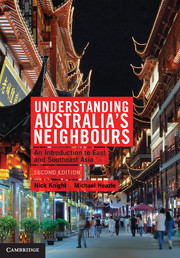Book contents
- Frontmatter
- Contents
- List of Maps
- Acronyms and abbreviations
- Acknowledgments
- Maps
- Introduction
- 1 The idea of ‘Asia’
- 2 Tradition and modernity in East and Southeast Asia
- 3 Tradition and modernity in East and Southeast Asia
- 4 Colonialism in East and Southeast Asia
- 5 Nationalism and revolution in East and Southeast Asia
- 6 Nations and nation-building in East and Southeast Asia
- 7 International politics and East and Southeast Asia
- 8 Economic growth in East and Southeast Asia
- 9 Democracy, human rights and development
- 10 Globalisation and East and Southeast Asia
- 11 China–Japan relations and US power in the twenty-first century
- 12 Australia in Asia, ‘Asia’ in Australia
- Bibliography
- Index
- References
6 - Nations and nation-building in East and Southeast Asia
Published online by Cambridge University Press: 05 June 2012
- Frontmatter
- Contents
- List of Maps
- Acronyms and abbreviations
- Acknowledgments
- Maps
- Introduction
- 1 The idea of ‘Asia’
- 2 Tradition and modernity in East and Southeast Asia
- 3 Tradition and modernity in East and Southeast Asia
- 4 Colonialism in East and Southeast Asia
- 5 Nationalism and revolution in East and Southeast Asia
- 6 Nations and nation-building in East and Southeast Asia
- 7 International politics and East and Southeast Asia
- 8 Economic growth in East and Southeast Asia
- 9 Democracy, human rights and development
- 10 Globalisation and East and Southeast Asia
- 11 China–Japan relations and US power in the twenty-first century
- 12 Australia in Asia, ‘Asia’ in Australia
- Bibliography
- Index
- References
Summary
IN HIS FOURTEEN POINTS speech to the US Congress on 8 January 1918, US President Woodrow Wilson argued that the nations of post-war Europe should enjoy ‘self-government’, and that it was the absence of democratic accountability among the European states that had led to the outbreak of World War I. The impact of Wilson's call for democratic self-government had little impact on the colonial powers’ attitudes towards their colonies, but emerging nationalist movements in Asia interpreted it as a powerful ideological justification for independence and self-determination. Indeed, the colonial powers regarded self-government as an issue relevant only to European states and societies, and remained unwilling to divest themselves of the economic and political benefits that possession of colonies had brought. If anything, the behaviour of some colonial powers – particularly France, Britain and the Netherlands – became even more intransigent towards their colonies in the face of nationalist demands for political autonomy. They responded brutally towards colonial subjects who dared articulate demands for independence and an end to colonialism.
Suppression of nationalist movements in the colonies of East and Southeast Asia was successful prior to the outbreak of World War II in the Pacific (1941–45). On the eve of the Pacific War there was, with the exception of the American colony of the Philippines, little indication that the colonies of the region would ever be granted independence. But the onset of the Pacific War had a decisive influence on the fortunes of nationalist leaders and movements, and was truly a watershed in the history of East and Southeast Asia. Japanese imperialism had the extremely important effect of destroying or undermining colonial administrations in the colonies of Southeast Asia (Hong Kong, Indochina, Burma, Singapore, Malaya, the Philippines, the Dutch East Indies). It also significantly weakened the Nationalist Government of China and strengthened the hand of the Chinese Communists. The destruction of the power of colonial administrations was accompanied by the destruction of their authority and legitimacy, since they were unable to defend their colonies against the Japanese. They were not omnipotent, and their fallibility had been truly and in some cases fatally exposed by the Japanese advance into East and Southeast Asia (Frey 2003).
- Type
- Chapter
- Information
- Understanding Australia's NeighboursAn Introduction to East and Southeast Asia, pp. 102 - 119Publisher: Cambridge University PressPrint publication year: 2011



